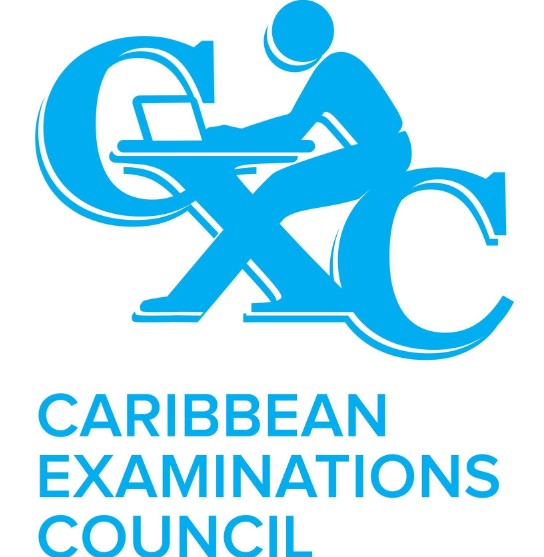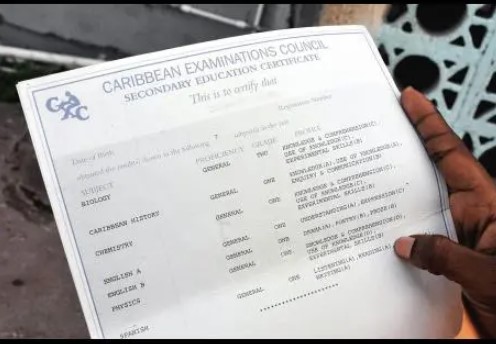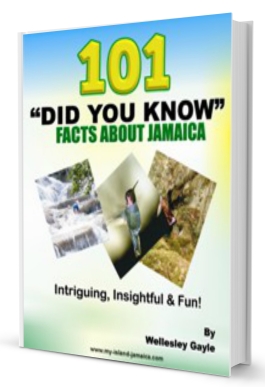Subscribe for all my updates and don't miss a thing! Sign me up!
What Is
CXC in Jamaica?
Sharing Is Caring! Share this awesome content with your friends now.
by Sheree-Anita Shearer | Associate Writer
Most Caribbean teenagers in the 5th form or 11th grade can only think about the upcoming CXC (Caribbean Examinations Council) Examinations they must sit and subsequently, the results of these examinations.
New! Take a piece of Jamaica with you💃!
Savour the memories! Now you can get your authentic Jamaican souvenir items, as well as traditional Jamaican herbs, spices and housewares on our popular e-store. Click Here to learn more.
And, if you ever need a trustworthy and knowledgeable local guide, consider booking a private tour with us!
The Caribbean Examination Council, founded in 1972, administers these proficiency exams across the CARICOM islands as a way to certify the student's ability to understand, comprehend and apply the knowledge of a particular subject.
These grades are then used for persons seeking jobs immediately after graduating high school or in the admissions process for university application either way the CXC results are essential.
What is the meaning of CSEC?
It is not enough to understand what CSEC stands for to know this. The Caribbean Secondary Education Certificate is a subject-based qualification exam introduced by CXC in 1979.
Are CSEC and CXC the same?
This is a common question and many people, even those who have sat the exams already are not quite sure what the relationship between the two is. The common misconception is that CXC and CSEC are both names for exams. CXC is actually the name of the organisation, the Caribbean Examinations Council which sets the yearly CSEC exams (Caribbean Secondary Education Council).
But CSECs aren’t the only exams. CAPEs (Caribbean Advanced Proficiency Examinations) were introduced in 1998.
What are CAPE subjects?
After sitting the CSEC subjects, high schoolers can sit CAPE subjects in the 6th form programmes at secondary schools across the island. The CAPE programme usually has a prerequisite for CSEC subjects in the discipline you wish to study in 6th form.
They help assess students' academic, technical, and vocational achievements in the Caribbean islands.
CAPE subjects are sometimes an advantage for students who intend to attend university as they often count towards courses and doing enough CAPE subjects can lessen required courses up to a semester or an entire year, if you complete the full two years of 6th form.
Who is eligible for CSEC?
Are CSEC subjects only done by teenagers? Definitely not!
CSEC subjects, while predominantly done by high schoolers, are eligible for anyone who fits the following criteria:
- 11 grade (or 5th form) students at public secondary schools
- Students above the age of 10 at private institutions
- Private candidates who have attained 16 years old
It is quite common for even adults to do CSEC subjects, most times it's for a job or, because of the weight placed on the subjects, it is for self-actualisation.
How do you know you’ve passed the CXCs?
Students of the past had to make their way back to the high school or examination centre to collect the hard copy results. But with the advancement of technology, then you can see your results almost immediately. However, you will still need the hard copy for official use. This is usually provided sometime later.
What are the levels (proficiencies) in CSEC exams?
There are three different levels of CSEC examinations, basic, general and technical.
The basic level is the least challenging of all where you can do the exams with the understanding that you will study further to gain knowledge to complete a secondary course.
The general proficiency ascertains the individual's grasp on the subject and gives them the option to specialise in that specific area after their secondary programme ends, should they be successful in the exams.
The technical proficiency exam qualifies those who are successful in the exams with pre-technician training or a more practical orientation to the subject than the general proficiency tests would.
The general proficiency exams are the most popular of the three.
When are CSEC exams done?
These examinations are done twice a year. The first period spans the months of May and June and results are usually ready by August. Should your result come back unfavourable, then there is a re-sit period in January.
This, however, is only permitted to those students who attained 50% or more in their SBAs and wished to reuse the scores or those candidates from part-time exam centres.
How do you register for CSEC exams?
High Schools and private candidates have separate deadlines although they both will sit the exams at the same time. For those who are sitting the May/June exams, then private candidates and in-school candidates should be registered by November and December respectively.
For the January re-sit period, everyone should be registered by the end of September.
How many passes are there for CXCs?
Well for the CSEC results grades 1-3 are passes, but the full range of the grading systems goes up to 6. In addition to these grades, a lettering system is also used to analyse the profile within the grade.
The profile further breaks down the person's proficiency in the subjects and measurements such as Knowledge and Comprehension, Application, Evaluation and Problem Solving are highlighted using the lettering system.
That sounds a little confusing, so let me give you an example.
If a candidate sits on the Social Studies exams and passes with a 3, the number only tells you the grade the person passed with. The profile will tell you specifically what letter of proficiency the candidate is at.
Based on the grade you will receive a straight letter profile or a mixture of the 6. For example, a person who receives a grade of 1 with a straight A profile, has shown great proficiency in the subject. A Grade one usually means a straight A profile but, this is not always the case.
Remember I said the CSEC passes were important for university admissions? You are only permitted to continue your academic journey if your CSEC results are between 1 and 3. Anything below that is deemed too limited an understanding of the subjects to further your study in the field. You are allowed to re-sit as many times.
What are the subjects offered for CSEC exams?
The CXC offers 33 subjects, 28 of which are general proficiency and the other 5 are only offered under technical proficiency. These are:
- Additional Mathematics
- Agricultural Science (Single and Double Award)
- Biology
- Building Technology
- Caribbean History
- Chemistry
- Clothing & Textiles
- Economics
- Electronic Document Preparation & Management
- English A (English Language)
- English B (English Literature)
- Food & Nutrition
- French
- Geography
- Home Economics Management
- Human and Social Biology
- Information Technology
- Integrated Science
- Mathematics
- Mechanical Engineering Technology
- Music
- Office Administration
- Physical Education & Sport
- Physics
- Principles of Accounts
- Principles of Business
- Religious Education
- Shorthand
- Social Studies
- Spanish
- Technical Drawing
- Theatre Arts
- Visual Arts
Most students sit between 5 and 12 subjects in one period, and some sit up to 20, although this is not encouraged.
Is CSEC recognised?
The Universities in the region generally accept CSEC exams as passes. Although they often have their own stipulations.
For example, if core subjects, Math and English are not Grade 1 (or sometimes Grade 2) passes, then the university will still admit you based on a proficiency test in that subject. If you are unable to pass this test, you’ll be placed in a class to improve in these areas.
All universities, colleges and community colleges in Jamaica accept CSEC passes for admission.
In addition, these international schools also accept CSEC passes:
- American Association of College Registrars and Admission Officers
- Cambridge University Examinations Syndicate
- Joint Matriculation Board, UK
- The Association of Indian Universities has also recognised CSEC conducted by the Caribbean Examination Council
The recent emergence of the very popular school ranking in Jamaica is deduced from the number of students from each school who sat the exams and the average passing grade they attained.
Sharing IS Caring! Please help me get the message out by sharing this article with your friends on social media (links below). Thnx ;-)
If you found this page useful, please consider subscribing to my weekly newsletter, to get even more.
It tells you each week about the new information that I have added, including new developments and great stories from lovers of Jamaica!
Return to Jamaican Education from CXC In Jamaica
Return to My Island Jamaica Homepage from CXC In Jamaica
References & Sources For CXC In Jamaica
- CxEasy. 2022. Everything You Must Know About CSEC & How to Get It. [online] Available at: [Accessed 26 September 2022].
- My-Island-Jamaica.com. 2022. Ranking Of High Schools In Jamaica - Jamaica's Top Secondary Schools. [online] Available at: [Accessed 26 September 2022].
- My-Island-Jamaica.com. 2022. 2018 - 2019 Ranking Of High Schools In Jamaica. [online] Available at: [Accessed 26 September 2022].
CXC in Jamaica | Written: September 26, 2022
New! Get My Latest Book👇🏿
|
You asked, I've answered! You no longer need to save for months or years, to enjoy paradise! I spilled the beans! sharing my top tips on finding cozy accommodations and secret gems, only the way a native could! Click Here to pick it up on my e-store and start saving now! |
See The Best Of Jamaica - In Videos!
|
My channel reaches over 140,000 subscribers worldwide and has leveraged over 11 million views, sharing, what I call 'The Real Jamaica'. Subscribe today and join our family of viewers. |
Read More ...
New! Experience The REAL Jamaica!
Book Your Private Tour here and experience Jamaica the way we (locals) do!
P.S. Didn't find what you were looking for?
Still need help?
Click Here to try our dependable and effective Site Search tool. It works!
Or, simply click here and here, to browse my library of over 500 questions and answers! Chances are someone already asked (and got an answer to) your question.












New! Comments
Have your say about what you just read! Leave me a comment in the box below.